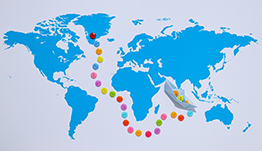News
The Increasing Role of International Logistics in Trade
In the globalized context of modern times, international logistics has become one of the facets contributing weightily to the global economy. With the expansion of business activities beyond domestic shores, trans-border flow of products and services has become a necessity.
What is International Logistics:
International logistics is defined as a set of interrelated warehousing and transportation processes conducted on paid terms and aimed at delivering goods from the manufacturer to the consumer located in a different country. This includes areas like overseas shipping, international distribution, customs, and warehousing. These activities are necessary to guarantee prompt, efficient, and safe delivery of goods globally.
Key Components of International Logistics:
Transportation: This entails choosing the best mode of transport (sea, air, road, or rail) on the basis of the cost and speed going to the type of goods to be moved.
Customs Regulations: Different customs regulations and policies have to be followed in different countries otherwise it may cause inconveniences with respect to time and business.
Documentation: Non-compliance with documentation requirements can lead to problems with cross-border delivery of goods including the transportation companies as well as their clients.
Warehousing and Inventory Management: A geographically targeted network of warehouses permits efficient storage as well as distribution to minimize lead times and control inventory costs.
Supply Chain Visibility: New technologies make it easier to implement various measures to improve the visibility of the supply chain by providing ability to track in real time.
Difficulties Faced by Companies in International Logistic:
Complex Regulations: Different countries can impose different customs laws, tariffs, and restrictions on imports and exports, which can act as stumbling blocks for businesses.
Cost Volatility: Transportation expenses are usually a large part of the budget, therefore fuel costs, currency exchange rates, and many other surcharges tend to present budgeting problems.
Geopolitical Risks: A number of factors, which include, but are not limited to political risks, trade conflicts, and some disasters can break the supply chains system thus causing halts and interruptions.
Strategies to Obliterate Challenges:
Relying on Advanced Technologies: adoption of informative technologies such as, blockchain, artificial intelligence and IoT for visibility, automation and cost savings purposes.
Differentiating Transportation Routes and Partners: The more suppliers and logistics partners one has, the less one is exposed to the risks that come from relying on one source.
Just as the judicious flow of money across geographical boundaries constitutes international finance, international logistics underpins international trade.
Recommended Products
Hot News
-
A Vital Freight Mode Connecting The World
2024-01-16
-
The Continued Development Of Our Freight Shipping Company
2024-01-16
-
The Importance Of A Trucking Company
2024-01-16

 EN
EN
 AR
AR
 FR
FR
 DE
DE
 PT
PT
 RU
RU
 ES
ES
 TR
TR
